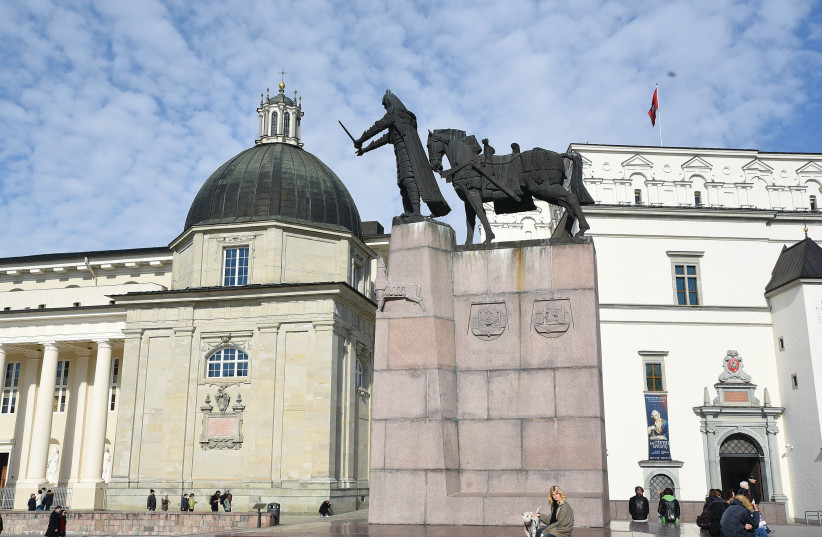Two months ago, nearly seven months since Russia made its incursion into Ukraine, I spent a week visiting the Baltic capitals of Lithuania and Latvia. At that time there were very few visitors from the West. The purpose of my visit was to learn as much as possible about the history of the Jews in Vilnius and Riga, to be able to compare that history to Jewish life there today.
Upon arrival in Vilnius, our Lithuanian guide, a specialist in religious studies who was born and raised there, gave us a lengthy walking tour of the Jewish quarters and shared some details about the lives of those who lived in Vilnius before their deportation and death. She emphasized that within some scholarly circles today there is interest in how Vilnius locals recall the oppressing forces that were responsible for the annihilation of many thousands of Lithuanian Jews during the Holocaust.
Perhaps her most striking comment about the majority of the locals was that “they aren’t really thinking so much about what happened to the Jews during the Holocaust.” It was unclear whether they are distracted by the current wartime conflict between Russia and Ukraine, or if they find that discussions of the atrocities during the Holocaust are too complicated to confront and thus more easily avoided entirely.
After these conversations, I felt rather uneasy and unsettled, especially at night when I was trying to sleep in a small, quaint hotel only steps from where a dynamic Jewish community had thrived for hundreds of years before being terrorized and then killed during World War II. I was tormented by thoughts of large groups of Jews innocently walking along the cobblestone roads at night, conversing in Yiddish and most likely completely unaware of their imminent demise.

Tormented by the demise of the Jews of Vilnius and Riga
On a day in Vilnius when we were not part of an organized tour, my spouse and I entered a quasi-modern neighborhood near the old Jewish quarter. The ruins of the Great Synagogue of Vilna lie buried beneath a building that the Soviets built during the war to replace and conceal any vestige of the synagogue’s very existence. The Soviets did not entirely achieve their goal. The synagogue’s ruins are still intact underground; to our delight, the excavation site next to the Soviet building was easily accessible. I approached but did not enter the large hole in the ground leading down into the ruins.
As a tribute to the age-old Jewish custom of leaving rocks on graves, I gathered a few pebbles from the site to bring home and place on the gravestones of my deceased relatives in the US. To carry the pebbles across the world would somehow give new meaning and life to a material structure that belonged to an otherwise lost world.
As we left the ruins of the Great Synagogue and our hotel by the old Jewish quarter, I beheld the center of a very modern-day Vilnius, where there were more people on electric scooters than there were in automobiles. The city is green and clean, bright and beautiful, and full of young people who sit at outdoor cafes, enjoying lengthy conversations and foamy cappuccinos.
While observing this part of urban Vilnius thrive, I continued to grieve for the plight of the multiple past generations from the destroyed Jewish community, and for my ancestors from the nearby village of Slonim who fled to the US during the 19th century in an attempt to escape the pogroms against the Jews.
THE SENSE of strangeness while visiting Vilnius carried over to my experience of Riga, which also bears indelible traces of the Jewish past. What especially struck me in Riga was the vitality of the Russian language among the Jews. A prominent member of the local Jewish community, with whom I conversed at length, told me that Riga has a Chabad-centered school, as well as another Jewish school that welcomes students from all backgrounds and religions interested in learning about Jewish culture.
She said that both schools teach students to be literate in Russian, not in Latvian. This is because many Latvian Jews of all generations speak Russian among themselves and in their households, in keeping with the Jewish tradition of maintaining literacy in Russian.
She expressed concerns that because of the current Russian incursions into Ukraine, these schools may eventually eliminate teaching Russian from the curriculum. She added that the regular use of Russian within the Riga Jewish community is a very sensitive issue that should not be discussed in a publication, for it is “too complicated for people ‘from the outside’ [of her community] to understand.”
In my view, the attempt to preserve the Russian language within this community is reminiscent of promotions of Yiddish as the official language of the Jews. It is noteworthy in this regard that on September 19 of this year, the Baltic states and Poland officially ceased to issue short-stay tourist visas to Russian citizens seeking to enter Latvia or Lithuania. The implementation of this policy has no doubt elicited further contentious discussions of the official status of Russian within these Jewish schools.
My experiences in Jewish Vilnius and Riga on the ground, although brief, gave me an extraordinary opportunity to discover meaningful aspects of Jewish life in both places. In Vilnius, I saw the vestiges of a once-vibrant community against the foreground of today’s world. In Jewish Riga, I discovered a dynamic community in which a past linguistic tradition still defines at least part of its cultural identity today.
The writer is adjunct faculty at Springfield College, where she teaches courses on Holocaust literature. She is the author of Writing Resistance and the Question of Gender: Charlotte Delbo, Noor Inayat Khan and Germaine Tillion.
